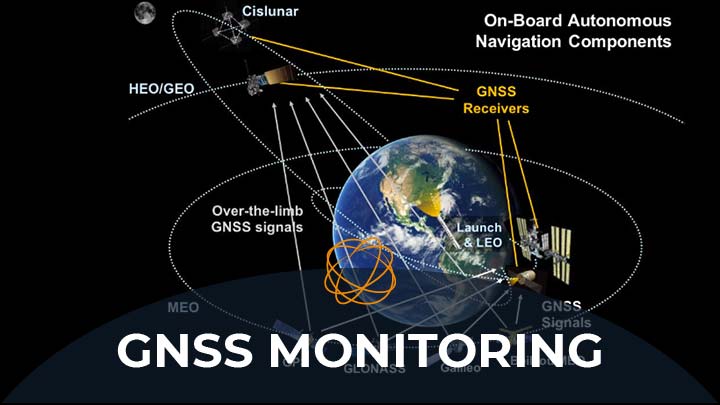GNSS Monitoring Working Group
Established: 2017
Chair: Erik Schönemann
Mailing List: IGS GNSS Monitoring Working Group Mailing List
Charter
The GNSS landscape is undergoing a fundamental transition. New systems are being built up in addition to legacy GPS and GLONASS: the Chinese BeiDou, the European Galileo, the Japanese QZSS, the Indian IRNSS. In parallel GPS and GLONASS undergo modernization. New signals and frequencies are becoming available. In the near future more than 100 satellites of global navigation systems will be broadcasting navigation information. Users will use these systems as one single system of GNSS, benefiting from the enhancements contributed by the individual systems. To optimally exploit the benefits of multi-GNSS, users require homogeneous common monitoring of the performance of the individual constellations and signals, to verify service commitments are met and to ensure public confidence in GNSS service provision and interoperability.
The International Committee on GNSS (ICG) established the International GNSS Monitoring and Assessment (IGMA) Task Force at the ICG-6 meeting in Tokyo 2011, tasked to facilitate cooperation and information between providers and scientific organizations that engage in open service signal quality monitoring. The International GNSS Service (IGS) has played a key role in producing precise GNSS products since its inception in 1994. It is active in coordinating the operation of a global multi- GNSS network and generates multi-GNSS products in the framework of the Multi- GNSS Pilot Project (MGEX), and generates real-time products in the framework of the IGS Real-Time Service (RTS).
The ICG recommended at the ICG-10 meeting in Boulder 2015 that the IGMA Task Force and IGS initiate a joint Trial Project to demonstrate a global GNSS Monitoring and Assessment capability, utilizing existing resources and infrastructure and avoiding duplication. Participation from non-IGS analysis groups, networks and data centers is invited to develop benchmarking between groups and generate analysis products, cross sharing between existing IGS functional streams and IGMA activities. Initially a limited number of parameters are proposed to be monitored to demonstrate the monitoring service and exercise it operationally. This will be followed by a broader set of parameters to be monitored as the system approaches permanent operations.
The IGS Monitoring WG is established in order to install, operate and further develop a GNSS Monitoring and Assessment Trial Project jointly with ICG’s IGMA Task Force, taking into account the Terms of Reference of the IGMA TF for the IGMA-IGS Joint Trial Project, utilizing existing resources and infrastructure, and creating publicly available, useful data products.
Goals and Objectives
Install, operate and further develop a GNSS Monitoring and Assessment Trial Project to show the capability of a future operational International GNSS Monitoring and Assessment system with using a limited number of selected parameters, existing monitoring infrastructures, organizations and procedures, avoiding duplication and overlap with existing IGS efforts.
Initially monitor a restricted set of parameters, including broadcast ephemerides and clock corrections broadcast by all GNSS (GPS, GLONASS, BeiDou, Galileo, QZSS) in post-processing mode using a common and agreed calculation and validation methodology and specified processing period, interval and latency. IGS precise orbit and clock products serve as a benchmark. Eventually broaden the set of parameters to provide a more complete monitoring of GNSS signals and services.
Develop real-time monitoring capability using data streams and additional monitoring parameters for GNSS as well as draft operational procedures for a monitoring service.
Make all monitoring input data available to guarantee transparency of monitoring product generation.
Make multi-GNSS monitoring products available to users and demonstrate the user’s benefit of combined use of multi-constellations.
Report status and progress of the GNSS Monitoring and Assessment Trial Project to the ICG IGMA Task Force and the IGS GB.
Maintain an Implementation Document describing the details of the implementation of the GNSS Monitoring and Assessment Trial Project based on the corresponding IGMA TF ToR.
Implementation Document
The Implementation Document describes the implementation details of the GNSS Monitoring and Assessment Trial Project according to the corresponding IGMA TF ToR.
It provides the list of parameters to be monitored together with detailed requirements, terminology, methodology used for computing and validating the monitoring products, and sampling, latency, distribution channels of the monitoring products, and operational procedures. It lists the participating organizations and infrastructure.
The Implementation Document is subject of regular review by the IGS GB and the IGMA TF.
Organizational Structure
The GNSS Monitoring and Assessment Trial Project consists of a tracking network, data centers, analysis centers and product servers as described in the Trial Project Charter and avoiding duplication of existing services. It is coordinated by a Product Coordinator and operated and supported by the Monitoring Working Group. It is open to new contributors of components at any time. New ACs are welcome to participate as Monitoring AACs.
The GNSS Monitoring and Assessment Trial Project is utilizing the existing infrastructure of the IGS as much as possible without disrupting standard activities. The processing of GNSS data is performed outside the IGS operational activities, but may be carried out by existing IGS ACs and new AACs.
The list of WG members is listed in the Annex I. The participants, components and stations are listed in the Trial Project Charter.
The GNSS Monitoring Working Group will convene meetings as necessary, involving IGMA TF, to plan, review, and resolve issues on the Trial Project. The Working Group will take into account all guidance provided by the ICG.
Monitoring Parameters
- Parameters to be monitored together with terminology as well as methodology and algorithms to calculate, compare, validate and distribute each monitoring product are described in detail in the Implementation Document..
Data and Products
- IGS data form the basis for the monitoring activity in the framework of the GNSS Monitoring and Assessment Trial Project. Data used and products generated in the framework of the GNSS Monitoring and Assessment Trial project are made publicly available adhering to IGS’ open data policy.
- Products, product sampling and latencies, and dissemination channels are described in detail in the Implementation Document.
Task Plan
A) Initial Tasks, Workplan 2016
- Issue a CfP inviting GNSS Provider Service Centers, IGS and MGEX ACs, IGS DCs, Networks, and other interested IGS and non-IGS groups to contribute to the joint IGS-IGMA GNSS Monitoring and Assessment Trial Project, defining timeframe, structure, requirements, operation modes, and expectations of the Trial Project.
B) CfP Deadline
- August 2016
C) Charter Finalization, Launch of the Trial Project
- Finalize the Implementation Document, bases on the corresponding IGMA TF ToR, including the detailed final initial list of parameters to be monitored with terminology, methodology used for computing and validating the monitoring products, and sampling, latency, distribution channels of the monitoring products.
- Launch of the GNSS Monitoring and Assessment Trial Project.
D) Implementation of the Trial Project
- Ensure participants and processes are in place to operate the Trial Project.
- Operate the Trial Project.
- Document key processes, such as for defining monitoring parameters and data products, and for adding Analysis Centers.
- Provide reports back to the sponsoring organizations (IGMA Task Force and IGS Governing Board) on the status and accomplishments of the Trial Project.
E) Termination of the Trial Project
- Criteria to terminate the Trial Project [to be defined]
- All the following objectives have been met
- The Trial Project is able to monitor the designated parameters using the calculation and algorithms identified, and generate publicly available data products are deemed useful.
- Processes are defined for defining new parameters and for registering new Analysis Centers,
- The organizational structure (within or outside the IGS) has been established for maintaining and operating a GNSS Monitoring and Assessment Service.
- The IGMA or the IGS is ready to implement a fully operational monitoring service or has determined that such a service is not feasible.
ANNEX I: List of WG Members
Representatives of the contributors to the Joint IGS-IGMA Monitoring Pilot Project ex officio:
- Multi GNSS WG Chair or representative
- Infrastructure Committee Chair or representative
- Real-Time WG Chair or representative
- Data Center WG Chair or representative
- Analysis Center Coordinator or representative
IGMA Monitoring Working Group and Pilot Project
Working Group The IGS Monitoring WG operates and further develops a GNSS Monitoring and Assessment Trial Project jointly with ICG’s IGMA Task Force, to show the capability of a future operational International GNSS Monitoring and Assessment system, utilizing existing resources and infrastructure, and creating publicly available, useful data products. Pilot Project The GNSS Performance Monitoring IGMA-IGS Joint Trial Project implements an authoritative performance monitoring system for all participating GNSSs, utilizing existing IGS monitoring infrastructure. Through the Trial Project, user benefits of consolidated monitoring system products and combined use of multi-constellations are to be demonstrated. The Trial Project shall promote trust in GNSS via an ICG endorsed monitoring system.
Last Updated on 11 Jun 2024 19:47 UTC


